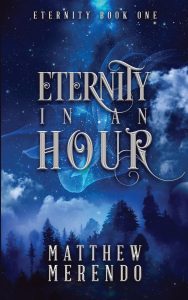Eternity in an Hour
 When I began Eternity in an Hour, I gave myself one stipulation: I would not think about a damn thing. I would just write straight through, from beginning to end, with no outline, no goals, no dreams, no hopes, no aspirations, nothing. Just write. That stipulation didn’t even last an hour.
When I began Eternity in an Hour, I gave myself one stipulation: I would not think about a damn thing. I would just write straight through, from beginning to end, with no outline, no goals, no dreams, no hopes, no aspirations, nothing. Just write. That stipulation didn’t even last an hour.
I realized very early on that I wanted to break a lot of the tropes that you so often find in high fantasy. I did not want to write an epic adventure novel in which a prophesied farmer finds the magical McGuffin and saves the world, vanquishing the evil wizard and marrying a prince(ss) in the process. I also didn’t want a noticeably medieval setting with a stratified society where people said things like “Forsooth!” and “Yonder castle!” Why, I wanted to know, did the presence of magic always retard civilization’s progress to the point that it can’t get past the Dark Ages?
So, as I created the Great Islands Nation of the Coquels — that’s pronounced CO-kells; pretend you’re French — I quickly realized that this was unlike any other fantasy novel I had read. The Coquellians were just like you and me — they had refrigerators and toilets and they said things like “What’s up?” and “Hey, dude.” Or at least the young twenty-somethings I was writing about did. They were just like us here in 21st-century Earth, though they got here with magic rather than technology.
The plot, too, is different. There’s a bit of action, primarily towards the end, and there’s quite a bit of romance thrown in as well, but the real thrust of the novel has to do with the characters’ growth over the course of the events, and this interest in the psychological rather than the palpable is more common in “mundane” literature than fantasy literature. My editor suggested that I add more lovin’, make the genre more clearly fantasy romance, but I liked the sort of jack-of-all-trades amalgamation I had created: part adventure tale, part bildungsroman, part romance, part travelogue. All fantasy, though. All fantasy.
Most people, however, do not like change. I’m not saying my novel is ground-breaking — far from it! — but it is different, and a lot of people had trouble reconciling that. One reviewer told me that I can’t have toilets in my fantasy world. Another thought the plot was uninteresting, boring, too slow. Another said the colloquial speech always yanked her out of the fantasy world. (Personally, that sounds more like a problem with the reader than the writer, but I’m probably biased. I could tell you why I think that, quoting John Gardner’s idea of the continuous dream, blah blah blah, but I won’t. Or maybe I will, but I’ll save that for a blog post.) Ultimately, though, I expected these mixed reviews, and there were just as many good ones, so I’m glad I stuck to my guns and refused to medieval up my story.
Read it, and tell me what you think.